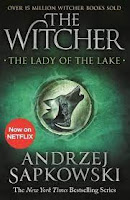Note: This review of The Lady of the Lake (1999), fifth and final volume in the Witcher series, is going to assume the reader has read the prior four books.
After four novels, we’ve finally reached the end of the Witcher novel series. It’s up to The Lady of the Lake to put the final stamp on proceedings. As with any final volume in a series, this means the impression of the entire series for many readers—the part coloring the whole.
Ramping up slowly through a series of framing scenes, The Lady of the Lake finally settles into real-time storyline. Geralt, and the group which accumulated around him in The Baptism of Fire, are in Toussaint awaiting news. Geralt is once again taking monster contracts, and on one fateful excursion learns of a plot to overthrow the Emperor. As an extra little nugget of information, Geralt learns Vilgefortz’s location, and so rushes back to his group in make an attempt at rescuing Ciri. Arriving at the castle, however, things take a left turn, leaving the fate of the group, and Ciri and Yennefer, up in the air.
For this reader, the Witcher series has been consistently inconsistent to date—at times slogging, and at others engaging. Sapkowski writes largely in theatrical mode (non-moving set pieces, heavy dialogue, etc.), and as such has struggled to convey the larger fictional world to a tangible degree. The places, cultures, and peoples of the Witcher world are a distant, muddy brown. Epic/dark fantasy does not require a well-built world to be a success, but it does put the burden of success on character and scene, i.e. theatrical mode. Not a playwright, unfortunately, Sapkowski has moved fluidly between strong and weak—at times pushing the narrative in meaningful, engaging fashion, and at others in non-tangential, spurious fashion. The Lady of the Lake continues this modus operandi.
Sapkowski also continues the trend of stories within stories by jumping around in time and place. If the reader has read this far, this mode likely adds interest rather than confuses. If anything, it makes the book and series re-readable and prevents the series from being to vanilla.
But you’re potentially here for story, so let’s take a look without spoiling things. The series has been driven by three main characters, Geralt, Yennefer, and Ciri, and in The Lady of the Lake, Sapkowski provides each an appropriate resolution to their arc. The stories of the three main characters are resolved in what is likely to be satisfying fashion for most readers. Sapkowski makes an interesting structural choice by resolving one of the arcs much earlier than the other two. I personally think it would have been better to intertwine all three given the main motivator of the series as a whole, but, it is what it is. The quality of the resolutions, and how they fit the series’ story, will depend on the reader. All I can say is that Sapkowski does not wrap things up with a pretty pink bow, nor does he try to become too clever for the series’ good. Overall, a good balance.
In the end, I’m of two minds about The Lady of the Lake. Structurally, Sapkowski accomplishes his overarching goals for the series and the Witcher is a unique premise with promise fulfilled—more often than not. But damn, he often gets in his own way doing so. And I'm extremely curious if a year let alone ten from now I will remember anything save the premise. This is more than some books I have read a couple of months ago, but far short of impatience for a re-read, or even possible re-read. It's been four years since I played The Witcher III: Wild Hunt and I still remember the story...


No comments:
Post a Comment